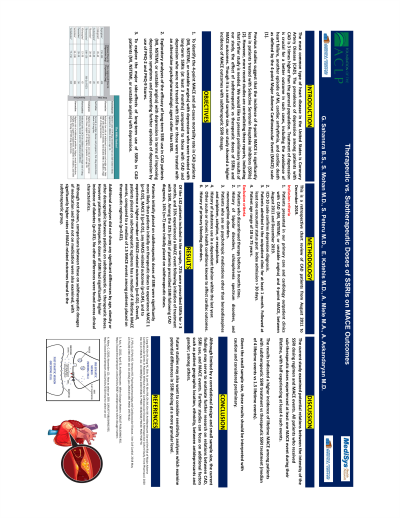Psychopharmacology and Toxicology
(150) Therapeutic vs. Subtherapeutic Doses of SSRIs on MACE Outcomes

- GS
Gurpreet Sahansra
Medical Student
NYITCOM
Jamaica, New York - SM
Shivani Mohan, M.D.
Resident Physician
Jamaica Hospital Medical Center
Rego Park, New York - AM
Andrew Miele, n/a
Biostatistician
Jamaica Hospital Medical Center
Jamaica, New York - SP
Sachidanand R. Peteru, M.D.,DFAPA.
Director of Consultation-Liaison Psychiatry
Jamaica Hospital Medical Center
JAMAICA, New York
Presenting Author(s)
Co-Author(s)
Background: The most common type of heart disease in the United States is Coronary Artery Disease (CAD). The prevalence of depression among patients with CAD is 3-fold higher than the general population. Treatment of depression is crucial for a better outcome in such cases, including the avoidance of heart failure, another episode of MI, cardiac arrhythmia, and cardiac death as defined by the 4-point Major Adverse Cardiovascular Event (MACE) scale (Jang, 2020). Previous studies suggest that the incidence of 4-point MACE is significantly less in patients treated with Selective Serotonin Reuptake Inhibitors (SSRIs) (Piña, 2018). Variations in doses recommended by manufacturers can result in sub-therapeutic dosing regimens.
Significance: This study explores relationships between SSRI regimen intensity and MACE events among patients with CAD.
Methods: This retrospective study included patients with CAD from a large teaching hospital in NYC. Data extracted from the electronic medical records included demographics, clinical characteristics, medication use, and lifetime occurrence of MACE events. Wilcoxon’s signed rank test was used to compare groups across continuous variables and Fisher’s exact test was used to compare categorical variables.
Results: Of the 142 patients included in the sample, 72% were prescribed SSRIs for > 3 months, 43% experienced at least 1 lifetime MACE-related outcome, and 33% experienced a MACE event following initiation of treatment with SSRI. Among the 32% of patients prescribed SSRI following CAD diagnosis, 16% were initially placed on subtherapeutic doses. Patients initially placed on subtherapeutic doses of SSRI were significantly more likely than patients initially on therapeutic doses to have experienced lifetime MACE 1 (p=0.02), lifetime MACE 3 (p=0.01), any lifetime MACE-related outcome (p=0.04), and to have had experienced a higher number of lifetime MACE-related outcomes (p=0.002). However, there were no significant differences between groups regarding subsequent CAD, following initiation of SSRI (p=0.384). Additional analyses did not show significant differences by age, obesity, or other demographic or clinical characteristics between patients on subtherapeutic vs. therapeutic doses.
Discussion: The current study examined potential relations between the intensity of the SSRI dosing regimen and MACE events. The results indicated that despite a higher incidence of lifetime MACE among patients with subtherapeutic SSRI treatment, there was no increased incidence of subsequent MACE events.
Conclusion: Although limited by a correlational design and small sample size, the current findings may serve to motivate further research on relations between CAD, SSRI use, and MACE events. Additional studies can focus on additional diversity factors such as patient home location, insurance types, and gender, which is consistent with the theme of DEI.
References:
Jang HY, Kim JH, Song YK, Shin JY, Lee HY, Ahn YM, Oh JM, Kim IW. Antidepressant Use and the Risk of Major Adverse Cardiovascular Events in Patients Without Known Cardiovascular Disease: A Retrospective Cohort Study. Front Pharmacol. 2020 Dec 10;11:594474. doi: 10.3389/fphar.2020.594474. PMID: 33362548; PMCID: PMC7758770.
Piña IL, Di Palo KE, Ventura HO. Psychopharmacology and Cardiovascular Disease. J Am Coll Cardiol. 2018 May 22;71(20):2346-2359. doi: 10.1016/j.jacc.2018.03.458. PMID: 29773162.
Additional References not listed due to word count restraints.
Presentation Eligibility: Not previously published or presented.
Diversity, Equity, and Inclusion: Our submission significantly contributes to the promotion of diversity, equity, and inclusion by using a comprehensive dataset encompassing a diverse array of demographics, including race and ethnicity. This data originates from a teaching hospital situated in Queens, New York, in an underserved community. A substantial proportion of individuals are from low socioeconomic backgrounds. As a distinguished level 1 trauma center conveniently located near major airports, the hospital serves a diverse population. By meticulously analyzing demographic factors, our study and future ones aim to unveil any potential inequities in outcomes and determine whether they correlate with the intensity of care provided.

